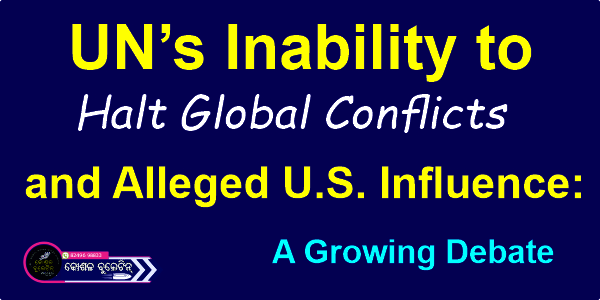The United Nations (UN), established in 1945 to maintain international peace and security, has faced persistent criticism for its inability to effectively stop wars worldwide. Despite its mission to foster diplomacy and prevent conflicts, the UN’s track record in halting ongoing wars—such as those in Ukraine, Sudan, Gaza, and the recent Israel-Iran escalation—has drawn scrutiny. Critics argue that structural flaws, particularly the veto power of the five permanent Security Council members (U.S., Russia, China, U.K., France), paralyze decisive action. For instance, the U.S. has vetoed ceasefire resolutions related to Gaza, while Russia and China have blocked measures concerning Ukraine, rendering the UN ineffective in enforcing peace.
Recent conflicts, like the U.S. and Israel’s strikes on Iranian nuclear sites in June 2025, highlight the UN’s limited influence. UN Secretary-General António Guterres called for diplomacy, but his remarks were dismissed as inconsequential by some, with outlets like the Washington Times labeling the UN “utterly irrelevant.” Iran’s plea to the UN Security Council to halt Israel’s attacks and prevent U.S. intervention went unanswered, further underscoring the organization’s inability to curb major powers’ actions.
Allegations of U.S. control over the UN have fueled global skepticism. The U.S. has “hijacked” the UN, undermining its credibility by vetoing resolutions that conflict with American interests, such as those demanding ceasefires in Gaza. Critics point to the U.S.’s significant financial contributions—covering 22% of the UN’s regular budget and 27% of peacekeeping funds—as leverage to shape agendas. The Trump administration’s recent cuts to UN programs, including $500 million from UNAIDS and humanitarian projects, have been cited as evidence of U.S. dominance, weakening the UN’s capacity in regions like the Pacific where China’s influence is growing.
However, defenders of the UN argue it was never designed to unilaterally stop wars but to facilitate dialogue and coordinate humanitarian efforts. The UN has mediated ceasefires, such as in Yemen, and provided aid in war-torn areas like Sudan, where over two million children have been displaced since 2023. The U.S.’s role, while influential, is countered by other powers like Russia and China, creating a balance that limits any single nation’s control. The UN’s universal platform remains a space for smaller nations to voice concerns, even if enforcement is lacking.
The perception of U.S. dominance is further complicated by declining global confidence in American leadership. A Pew Research Center survey from June 2025 found that over 60% of people in allied nations like France, the U.K., and Japan lack confidence in U.S. President Donald Trump’s handling of world affairs, including conflicts like Israel-Iran and Russia-Ukraine. This erosion of “soft power” weakens the U.S.’s ability to unilaterally steer UN decisions.
The ongoing Israel-Iran conflict, with U.S. intervention via “Operation Midnight Hammer” on June 21, 2025, has intensified debates about the UN’s relevance. While the UN condemned a Damascus church bombing and warned of regional instability, it failed to prevent or mediate the U.S.-backed strikes on Iran’s nuclear sites. Critics argue this reflects a systemic flaw: the UN’s dependence on powerful nations like the U.S., which can act unilaterally without consequence.
In conclusion, the UN’s inability to stop wars stems from its structural limitations and the veto power of major players, including the U.S., which is accused of exerting disproportionate influence. While the U.S.’s financial and political clout shapes UN operations, competing powers and global distrust limit its control. The UN remains a forum for dialogue but struggles to enforce peace, leaving its role in global conflicts under intense scrutiny




